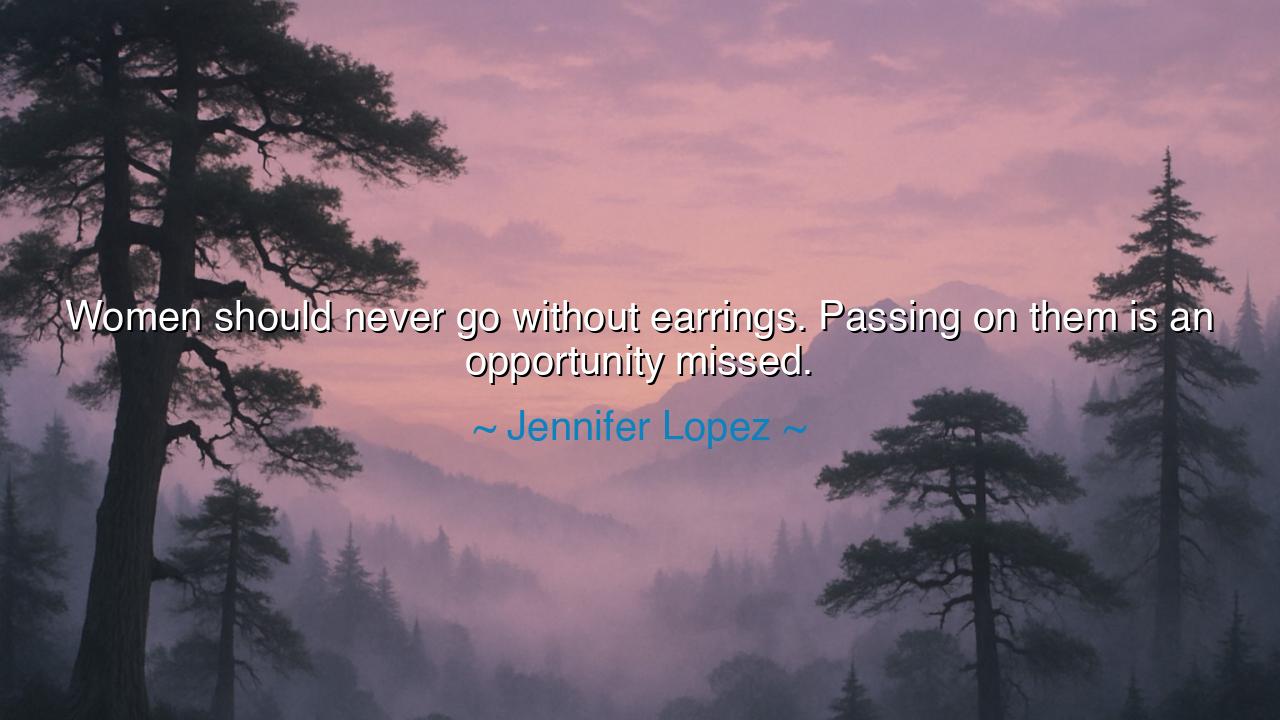
Women should never go without earrings. Passing on them is an






The words of Jennifer Lopez, “Women should never go without earrings. Passing on them is an opportunity missed,” may seem at first a lighthearted statement of style, yet within them lies a deeper truth about adornment, identity, and the expression of power. For throughout the ages, jewelry has not been mere ornament, but a language—one through which women have declared their beauty, their status, their resilience, and their place in the world. To wear earrings is to embrace visibility, to refuse to be hidden, and to shine forth as one worthy of being seen.
In the ancient spirit, adornment was never frivolous. The Egyptian queens wore gold and lapis not only to dazzle, but to proclaim their closeness to the divine. The earrings of a woman spoke of lineage, of wealth, and of sacred protection. Even in the humblest of villages, women carried small tokens of beauty in their ears, for such decoration was not vanity—it was a statement that they belonged to life, that their presence had weight and light. Thus, Lopez’s words are an echo of this long tradition: the belief that to forego adornment is to pass by a chance to embody one’s inner radiance.
Consider the story of Frida Kahlo, the artist who, despite enduring constant pain and tragedy, adorned herself with bold earrings, necklaces, and traditional dresses. Her art was on canvas, but her body was also a canvas—a declaration that even in suffering, beauty and strength would not be silenced. Her earrings were not trinkets; they were flames, symbols of defiance and creativity. Through them, she turned what could have been despair into a visible, vibrant assertion of identity.
Lopez’s saying also carries a more universal lesson: life is filled with small choices that appear trivial but are in truth opportunities to express the self. To wear earrings is not merely about fashion, but about seizing the chance to celebrate existence. To pass on them, as she says, is to let slip a moment in which beauty, confidence, and joy could have been claimed.
So let this wisdom endure: never underestimate the power of small adornments, for they are the sparks that remind us of the fire within. Earrings are more than metal and stone—they are symbols of presence, courage, and delight. And just as the ancients adorned themselves to honor both gods and life, so too should we see each opportunity for beauty not as vanity, but as a sacred chance to reveal the light of the soul.






NZnguyen zang
I get that Jennifer Lopez is sharing a style tip, but her statement raises a bigger question about societal expectations. If earrings are seen as an essential part of a woman’s look, does that imply that women are judged more harshly if they don’t meet those standards? Shouldn’t we be encouraging women to embrace their natural beauty, with or without accessories, rather than perpetuating the idea that something is ‘missing’ without them?
GDGold D.dragon
While Jennifer Lopez’s comment might be seen as playful advice on fashion, I can’t help but wonder if it’s too focused on appearance. Shouldn't women feel free to express their style however they choose, without feeling like something is missing if they’re not accessorized in a particular way? Isn’t it important for women to have the freedom to make style choices that reflect their personality, not just trends?
TAPham Nguyen Thanh An
This quote from Jennifer Lopez feels like a celebration of femininity and fashion, suggesting that small details like earrings can make a big difference in a woman’s look. But does this reinforce the notion that women need to be constantly ‘dressed up’ to be seen as polished or put-together? Is it possible that this view contributes to societal pressures on women’s appearance and style?
TLThu Le
Jennifer Lopez's quote seems to emphasize the idea that accessories like earrings are an essential part of a woman's style. While I understand the appeal of accessorizing, does this statement imply that women need to constantly conform to beauty standards? Shouldn't a woman's worth and style be defined by more than just her appearance or what she wears? What about those who prefer a more minimalist approach to fashion?